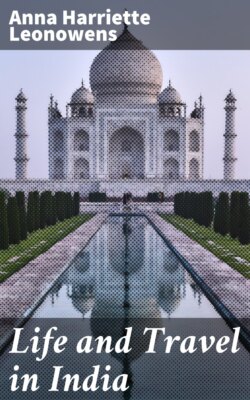Читать книгу Life and Travel in India - Anna Harriette Leonowens - Страница 3
На сайте Литреса книга снята с продажи.
PREFACE.
ОглавлениеTable of Contents
In the following pages, gathered from voluminous notes of early travel, I have tried to give a faithful account of life in India, as well as of the sights and scenes visited by me, with my husband, before the days of railroad travel.
It is well known that the introduction of the railroad into India has in no sense affected the life of the people, and has only very slightly modified the general appearance of the country. India is still what it was in the Vèdic period, a land of peasant classes; she still invokes, as did the ancient Aryans in the Rig Vèda, the "Khe-tra-pati," or the divinity of the soil, for blessings on the land. The Hindoo to-day lives, as did his forefathers, close to the heart of Nature, deifying the mountains, streams, woods, and lakes, while the sun, moon, stars, fire, water, earth, air, sky, and corn are his highest deities. The most beautiful personification in the Ramâyânâ of womanly grace and virtue is called Sita, "a furrow," showing how deep was the national reverence paid to the plough; and to this day at the Rathsaptimi, the day on which the new sun is supposed to mount his heavenly chariot, a feast is observed in honor of the sun, and the ryots on this occasion decorate with flowers and paint their ploughs, and worship them as the saviors of the land.
I do not, however, mean to say that India has made no progress whatever in all these years—her imaginative and glorious youth has no doubt been succeeded by the calm reason of mature age—but this transition has been gradual and progressive rather than fitful and sudden.
The transfer of India by the East India Company to the British Crown, and the recent laws for the protection of the ryot—or more properly the raiyat, a leaser of land held in perpetuity—against the oppressions of the zemindars, or governmental landlords, with the right of underletting the land, have to an extraordinary degree awakened the inborn desire of the Hindoo to become possessor of the soil and to return to his hereditary occupation of agriculture. To these may be added the security which England has conferred upon India, now that she is no longer disturbed by frequent wars, which desolated the land, and every now and then forced the people to abandon their villages and fly to the jungles and mountains for safety, under the Afghans, Mohguls, Mahrattas, and other predatory chiefs. Among the lasting benefits to India it may be mentioned that sutteeism, infanticide, self-immolation to the idols, Thuggism, and slavery have all been partially, if not quite, abolished by the strong arm of the law. Railroads have been built, the country has been opened, schools established, civil service appointments thrown open to the natives and Europeans alike, good roads made, canals and huge reservoirs for water excavated, ancient water-courses reopened, giving an impetus to private enterprise and industry in every direction. All these happy changes have been the result of the more liberal policy of England toward India since the days of the terrible mutiny of 1857; and it may fairly be hoped that British India has before her as glorious a future as her brilliant youth and maturity have foreshadowed for her.
A. H. L.
Sunnyside, Halifax, Nova Scotia,
August 7, 1884.
LIFE AND TRAVEL IN INDIA
